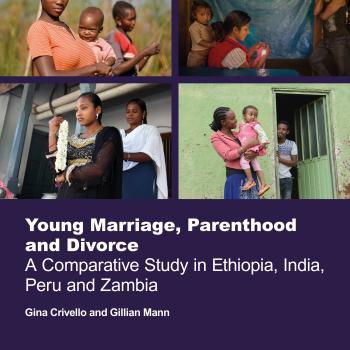Publication Information

This report presents emerging evidence from the Young Marriage and Parenthood Study (YMAPS), a comparative qualitative study of marriage, cohabitation, parenthood and divorce among marginalised adolescents and young people in Ethiopia, India (in the states of Andhra Pradesh and Telangana), Peru and Zambia between 2017 and 2020.
There is a growing body of knowledge about why adolescents girls in the Global South get married. However, there is much less information about how to support them once they are married or in a union, and how being married or cohabiting or being young parents alters their life trajectories.
Report authors Gina Crivello and Gillian Mann, who lead YMAPS reveal the lives of adolescent girls and boys and young people who are or were married or cohabiting or are parents through the lens of 6 themes;
What drives young marriage and cohabitation? Continuity and Change in marriage and informal unions; What do young people know about contraception and pregnancy, and what it is like to be a young parent? What drives the experience of unequal power dynamics between young couples? What causes violence and conflict in young married and cohabiting relationships? What leads to relationship breakdown, separation and divorce, and what are the consequences for young people?
The findings of the study suggest that a committment to the 'leave no one behind' agenda requires expanding the efforts to address child marriage to more explicity include the experiences of young people who are married or in informal unions, as well as those who are divorced and separated. A focus on adolescent sexuality, the experiences of boys and young men, and a more accurate understanding of girl's and boy's agency and decision making in their marriage and reproductive pathways are also needed.
We are publishing a policy brief to accompany this report which you can read here. For more on YMAPS please read here.

This report presents emerging evidence from the Young Marriage and Parenthood Study (YMAPS), a comparative qualitative study of marriage, cohabitation, parenthood and divorce among marginalised adolescents and young people in Ethiopia, India (in the states of Andhra Pradesh and Telangana), Peru and Zambia between 2017 and 2020.
There is a growing body of knowledge about why adolescents girls in the Global South get married. However, there is much less information about how to support them once they are married or in a union, and how being married or cohabiting or being young parents alters their life trajectories.
Report authors Gina Crivello and Gillian Mann, who lead YMAPS reveal the lives of adolescent girls and boys and young people who are or were married or cohabiting or are parents through the lens of 6 themes;
What drives young marriage and cohabitation? Continuity and Change in marriage and informal unions; What do young people know about contraception and pregnancy, and what it is like to be a young parent? What drives the experience of unequal power dynamics between young couples? What causes violence and conflict in young married and cohabiting relationships? What leads to relationship breakdown, separation and divorce, and what are the consequences for young people?
The findings of the study suggest that a committment to the 'leave no one behind' agenda requires expanding the efforts to address child marriage to more explicity include the experiences of young people who are married or in informal unions, as well as those who are divorced and separated. A focus on adolescent sexuality, the experiences of boys and young men, and a more accurate understanding of girl's and boy's agency and decision making in their marriage and reproductive pathways are also needed.
We are publishing a policy brief to accompany this report which you can read here. For more on YMAPS please read here.

